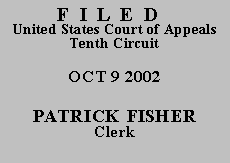 UNITED STATES COURT OF APPEALS
UNITED STATES COURT OF APPEALS
 UNITED STATES COURT OF APPEALS
UNITED STATES COURT OF APPEALS
| TOMMY LEE CLEATON,
Petitioner - Appellant, v. H. N. SCOTT and DREW EDMONDSON, Respondents - Appellees. |
|
This is a pro se § 2241 state prisoner appeal. In 1993, Appellant was convicted of attempted robbery by fear and sentenced to twenty years' imprisonment. His direct and post-conviction appeals were unsuccessful. While incarcerated, Appellant was transferred to a different prison facility. Even though he claimed that he was "medically unassigned" at his previous facility, Appellant was assigned to "work at the Prisoner's Public Works Program, [perform] Community Service, and [work in the prison] kitchen." Aplt. Br. at 15. Appellant failed to report to his assigned job. After a hearing, Appellant received a disciplinary misconduct which included fifteen days of segregation and thirty days of lost canteen privileges. Appellant also claimed that he was reassigned to a lower earned-credit level resulting in a loss of 314 days of earned credit a year.(1) Aplt. Br. at 3.
In his habeas petition, Appellant claimed due process and Eighth Amendment violations. The magistrate judge recommended that the petition be denied, reporting that Appellant received all of the process constitutionally due in prison disciplinary proceedings. The magistrate judge also recommended that Appellant's Eighth Amendment claim be denied since such a claim is proper in a § 1983 action but not in a habeas petition. After consideration of Appellant's objections, the district court adopted the magistrate judge's recommendation and denied the petition. Mr. Cleaton appeals to this court.
In order for this court to grant a certificate of appealability, Appellant must make "a substantial showing of the denial of a constitutional right." 28 U.S.C. § 2253(c)(2). To do so, Petitioner must demonstrate "that reasonable jurists could debate whether (or, for that matter, agree that) the petition should have been resolved in a different manner or that the issues presented were adequate to deserve encouragement to proceed further." Slack v. McDaniel, 529 U.S. 473, 484 (2000) (quotations omitted).
We have carefully reviewed Mr. Cleaton's brief, the district court's disposition, and the record on appeal. Nothing in the facts, the record on appeal, or Appellant's brief raises an issue which meets our standards for the grant of a certificate of appealability. We agree that Appellant received all of the process constitutionally due in prison disciplinary proceedings and that Appellant's Eighth Amendment is a § 1983 claim, not a habeas claim. Therefore, for substantially the same reasons as set forth by the district court in its Order of April 30, 2002, adopting the magistrate judge's recommendation, we cannot say that "reasonable jurists could debate whether (or, for that matter, agree that) the petition should have been resolved in a different manner." Id.
We DENY Appellant's request for a certificate of appealability and DISMISS the appeal.
Entered for the Court
Monroe G. McKay
Circuit Judge
*. This order and judgment is not binding precedent, except under the doctrines of law of the case, res judicata, and collateral estoppel. The court generally disfavors the citation of orders and judgments; nevertheless, an order and judgment may be cited under the terms and conditions of 10th Cir. R. 36.3.
1. We note that the magistrate judge's Report and Recommendation indicated that Appellant claimed a loss of 528 days a year. However, Appellant's brief indicates that the loss was 314 days a year.